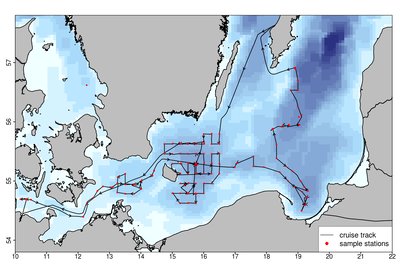OceanRep
Cruise Summary Report AL507: 15.04-29.04.2018.
Dierking, Jan  (2018)
Cruise Summary Report AL507: 15.04-29.04.2018.
(2018)
Cruise Summary Report AL507: 15.04-29.04.2018.
![]() .
GEOMAR, Kiel, Germany, 4 pp.
.
GEOMAR, Kiel, Germany, 4 pp.
|
Text
CSR_AL507.docx - Published Version Available under License Creative Commons: Attribution 3.0. Download (195kB) |
|
![[thumbnail of Cruise track]](https://oceanrep.geomar.de/43823/2.hassmallThumbnailVersion/Appendix%201%20-%20AL507%20cruise%20track.png)  Preview |
Image (Cruise track)
Appendix 1 - AL507 cruise track.png - Supplemental Material Available under License Creative Commons: Attribution 3.0. Download (323kB) | Preview |
|
Other (Stations)
Appendix 2 - AL507 Stationsübersicht.xlsx - Supplemental Material Available under License Creative Commons: Attribution 3.0. Download (43kB) |
Abstract
Physical, chemical, biological research and fishery oceanography
This multidisciplinary cruise extended a long-term data series on (eco-)system composition and functioning of the Baltic Sea, with a focus on the deeper basins. The series has been collected in similar form since 1986. A key characteristic of the cruise is the integration of oceanographic and biological information to enhance understanding of environmental and (fish) population fluctuations, and evolutionary processes in this system. The resulting datasets and samples feed into the EU projects BONUS BLUEWEBS and Horizon 2020 GoJelly, and the US NSF project "Evolutionary Responses to Global Change in Salinity and Temperature". The spatial focus lay on the Bornholm Basin as most important spawning area of Baltic cod, but also included the Western Baltic Sea, Arkona and Gotland Basin, Gdansk Deep, and Stolpe Trench.
Specific investigations included a detailed hydrological survey (oxygen, salinity, temperature) of the Bornholm Basin, plankton surveys (zoo- and ichthyplankton, with the goal to determine the composition and the abundance and vertical and horizontal distribution of species, and to take samples for later measurements of nutritional condition), and pelagic fishery hauls for clupeid and gadoid fish. The latter served to determine stock structure, gonadal maturation, stomach contents, and egg production of sprat and cod, and to sample tissue and otolith samples for individual-level genetic and ecological analyses of cod. The abundance and distribution of fishes in the cruise area was also assessed with hydroacoustic methods.
Additional cruise components were: (i) cod gonad sampling for fecundity studies and liver sampling for parasite studies. (ii) vertically resolved phytoplankton and zooplankton sampling for studies of plankton phenology. (iii) in-depth sampling of planktonic food webs for dietary tracer work. (iv) copepode Eurytemora affinis sampling along the salinity gradient of the Baltic Sea for the study of local adapations.
| Document Type: | Report (Cruise Report) |
|---|---|
| Funder compliance: | info:eu-repo/grantAgreement/EC/H2020/774499 |
| Research affiliation: | OceanRep > GEOMAR > FB3 Marine Ecology > FB3-EOE-N Experimental Ecology - Food Webs OceanRep > GEOMAR > FB3 Marine Ecology > FB3-EV Marine Evolutionary Ecology |
| Publisher: | GEOMAR |
| Projects: | BONUS BIO-C3, GoJelly, BONUS BLUEWEBS |
| Expeditions/Models/Experiments: | |
| Date Deposited: | 30 Jul 2018 09:40 |
| Last Modified: | 29 Jan 2021 09:04 |
| URI: | https://oceanrep.geomar.de/id/eprint/43823 |
Actions (login required)
 |
View Item |
Copyright 2023 | GEOMAR Helmholtz-Zentrum für Ozeanforschung Kiel | All rights reserved
Questions, comments and suggestions regarding the GEOMAR repository are welcomed
at bibliotheksleitung@geomar.de !


 Tools
Tools Tools
Tools
